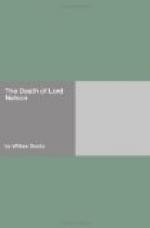[14] CAPTAIN HARDY deemed it his duty to give this information to Admiral COLLINGWOOD as soon as the fate of the day was decided; but thinking that HIS LORDSHIP might feel some repugnance to this communication, he left directions for Lieutenant HILLS to be detained on deck at his return, till he himself (Captain HARDY) should come up from the cockpit. Lieutenant HILLS was dispatched on this mission from the Victory, at the very time when the Enemy’s van ships that had tacked were passing her to windward and firing at her.
[15] Meaning that in case of HIS LORDSHIP’S surviving till all resistance on the part of the Enemy had ceased, Captain HARDY was then to anchor the British Fleet and the prizes, if it should be found practicable.
[16] Alluding to some wishes previously expressed by HIS LORDSHIP to Captain HARDY respecting the place of his interment.
[17] IT must occur to the reader, that from the nature of the scene passing in the cockpit, and the noise of the guns, the whole of His LORDSHIP’S expressions could not be borne in mind, nor even distinctly heard, by the different persons attending him. The most interesting parts are here detailed.
[18] Immediately after HIS LORDSHIP expired, Captain HARDY went on board the Royal Sovereign, to communicate the melancholy event, and the nature of HIS LORDSHIP’S last orders, to Admiral COLLINGWOOD.
[19] The Redoutable lay alongside and still foul of the Temeraire for some time after this, and till several Seamen were sent from the latter to the assistance of the two Officers and men belonging to the Victory who had before taken possession of the prize.
[20] These were the ships commanded by Admiral DUMANNOIR, and afterwards captured by the squadron under the command of Sir RICHARD STRACHAN. They were nearly half an hour in passing to windward, during the whole of which time they continued firing on the British ships.
[21] About twenty of the Redoutable’s guns were dismounted in the action. Those on that side of her lower deck opposed to the Victory, were all dismounted except five or six.
[22] Many of those who were slightly wounded did not apply for assistance till after the public return of killed and wounded had been transmitted to Admiral COLLINGWOOD, which therefore reports a smaller number than here stated.
[23] Brandy was recommended by the Surgeon in preference to rum, of which spirit also there was plenty on board. This circumstance is here noticed, because a very general but erroneous opinion was found to prevail on the Victory’s arrival in England, that rum preserves the dead body from decay much longer and more perfectly than any other spirit, and ought therefore to have been used: but the fact is quite the reverse, for there are several kinds of spirit much better for that purpose than rum; and as their appropriateness in this respect arises from their degree of strength, on which alone their antiseptic quality depends, brandy is superior. Spirit of wine, however, is certainly by far the best, when it can be procured.




